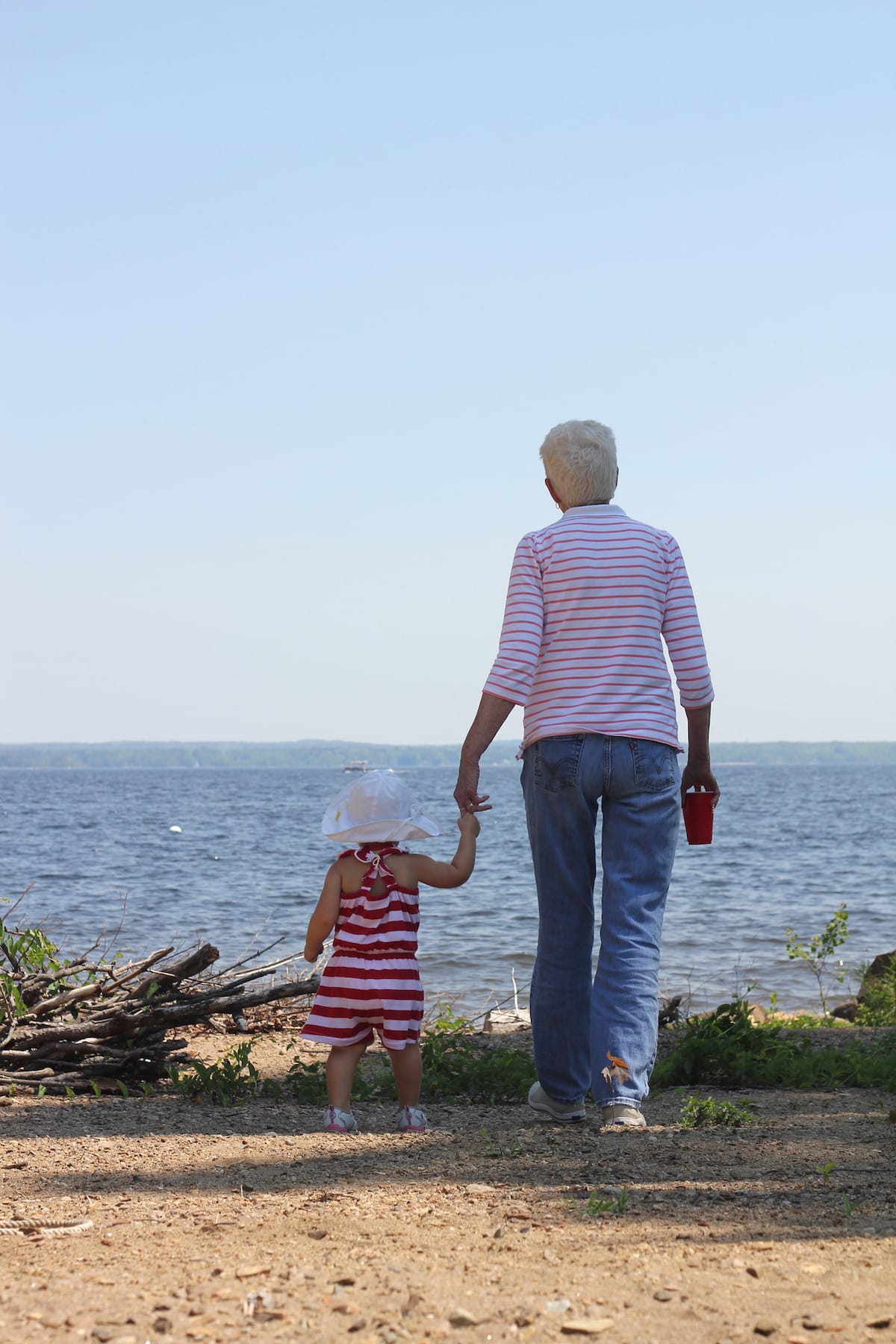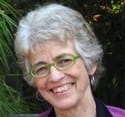Parents must attend to the nuts and bolts of their children’s care. But grandmothers, says Susan Moon, can pay attention to the continuity of everything in the background—water, air, stories, and love.
“You can understand all of Buddhism, but you cannot go beyond your abilities and your intelligence unless you have robai-shin, grandmother mind, the mind of great compassion.” —Eihei Dogen
My son Noah told me he wasn’t going to have children when he was about four and I was a harried single mother. It was time for me to take him to nursery school and he refused to wear anything but his fringed cowboy shirt, which was in the washing machine, clean but wet. I exploded in irritation and he announced, “I’m never going to have kids. It’s too much trouble!”
I was chastened. “It’s worth it, sweetie,” I said. “It’s definitely worth it!”
As he grew up, I watched him cuddle pets and babies, but well into adulthood he held to his plan of not having children, and I began to think I might never become a grandmother. A person can take certain actions to make it more likely that she’ll become a parent, but there’s not much she can do to produce grandchildren. So even when Noah got married, I tried to keep my mouth shut. I reminded myself that he didn’t come into the world for the express purpose of giving me grandchildren. It was his and Arcelia’s business. They had their careers, the economic challenge of parenting, and the imperiled planet to consider. Still, I did mention that I would be glad to babysit.
As a child, I was well loved by both of my grandmothers in their different ways. “Grandma” took me to Quaker meetings, wrote out her favorite prayers for me in a little notebook, and took me down the lane to her sculpture studio where she gave me clay to play with while she sculpted. I was her first grandchild, and when I climbed into bed with her in the morning, she’d take off her strange, black sleep mask and reach out to me so that I felt the cool, soft flesh that hung from her upper arm, and she’d say, “Good morning, my number one grandchild!”
My other grandmother, known as “Ma,” kept lemon drops in a white glass chicken on her dresser, and if you wanted one all you had to do was cough a little fake cough and she’d say, “My dear, you must have something for your throat.” Whenever we children visited, there were freshly baked chocolate cupcakes with vanilla frosting on a blue tin plate in the kitchen, and you were allowed to help yourself whenever you wanted. She always smelled delicious, of a certain perfume unlike anyone else’s, and she wore a gold chain bracelet with a tiny gold airplane dangling from it. I asked her why, and she told me it was a replica of the air force plane her youngest son, my uncle Morton, was piloting when he was shot down over Japan, and she wore it so she would never forget his courage. So small you couldn’t even read it, the serial number of uncle Morton’s plane was engraved on the replica’s wing.
I learned from my grandmothers the amazing truth that my own parents had been children long ago. I was stunned to learn, for example, that my father had been shy and that my mother had been mischievous. They weren’t that way with me! I learned sad things happen in people’s lives and yet they keep going. I learned of the turning of the generations: children turn into parents, and parents grow old and turn into grandparents.
I was at home in Berkeley when Noah called me on a Sunday afternoon from San Antonio, Texas, to tell me that Paloma had arrived. His voice was like a bowl of water he was trying not to spill. She was 20 minutes old at the time and they were still in the delivery room. Everybody was doing well. “Are you happy to be a grandma?” he asked eagerly, even though he knew the answer.
“Are you kidding? Nothing could make me happier!” Then I heard Paloma crying in the background. She wasn’t exactly crying for joy as I was. She was crying, Noah said, because they were sticking a needle in her heel to get some blood for a bilirubin test and she didn’t like it.
Driving around Berkeley that afternoon, doing errands, alone in the car, I kept shouting out, “Paloma! Paloma!”
I thought of all of the other babies born that day, all over the world, so many of them born into war or crushing poverty. There are about 353,000 human births a day on planet earth, and I felt like all of the babies that were born the day I became a grandmother were my grandchildren.
On that day, the front page of The New York Times told of civilian casualties in Beirut resulting from Israel’s bombing of Hezbollah and I found myself wanting to propitiate the gods, God, the Universe, whatever—to thank them for Paloma’s safe arrival and to ask them to keep her and all babies safe from such violence. What offering could I make and to whom? Checking my email that afternoon, I found a request for help from the Middle East Children’s Alliance and I made a donation in Paloma’s name—my first small effort, as a grandmother, to protect Paloma and all the others.
When I arrived in San Antonio, Paloma was two weeks old. She was asleep on her back the first time I saw her, so I could see her whole face. (Nowadays they tell parents always to put babies down to sleep on their backs because of SIDS. This was new to me.) Right away I saw how much Paloma looked like Noah when he was a baby—defined, not blobby, her whole self already present in her face. And I saw that she had her mother’s huge eyes. Soon she woke and Arcelia nursed her, and then I held her against my chest.
I stayed for a week, in the hot Texas summer, leaving the house only twice to go to the grocery store. I did a lot of cooking while the family napped. I danced around the living room with Paloma, trying to soothe her when she was fussy by swinging her in my arms and singing to her. The more vigorously I jiggled her, the better she liked it, and she didn’t care if I couldn’t remember all the words to the songs I dragged up from the basement of my mind—Christmas carols and old Beatles tunes. When she fell asleep in my arms, I lay down on my back on the couch, holding her carefully against my chest, and I let her sleep on top of my heart for as long as she cared to. In that time out of time, in that air-conditioned suburban living room, I smelled her sweet head and watched the oak leaves shifting in the hot breeze outside the window.
I learned other new things about taking care of babies—new to me, but based on ancient wisdom. I learned about the five S’s for soothing fussy babies: swaddling, swinging, letting them suck, holding them sideways, and making shushing noises. Noah was particularly good at the swaddling and he would coo to Paloma in a deep voice—“There, there, Pumpkin Head, now you’re all cozy”—as he tucked the blanket corners around her arms and wrapped her into a snug little package. During the course of my visit I also heard her addressed, by both parents, as Petunia, Little Miss Piglet, Florecita, Sweet Pea, Calabacita, and even Bunion Cake.
As for me, to my great delight, Arcelia called me Abuelita, little grandmother.
Sometimes, though it was 102 degrees, I carried Paloma out into the backyard and she instantly quieted. She looked up at the leaves in the trees and the big space of sky, and I could see her feeling the un-air-conditioned air on her cheeks. I could see she knew things were different here in the big outdoors. Noah, too, had loved to look at leaves when he was a baby. He still does.
Zen master Eihei Dogen, founder of the Soto School of Zen in thirteenth-century Japan, told his monks they should all develop “grandmother mind.” He said, “You can understand all of Buddhism, but you cannot go beyond your abilities and your intelligence unless you have robai-shin, grandmother mind, the mind of great compassion. This compassion must help all of humanity. You should not think only of yourself.”
Parents have to have a different kind of mind than grandparents. Parents have to attend to the nuts and bolts of their children’s needs—feeding them, sheltering them, keeping them warm. They have to protect them from cars, from sugar, from kidnapping. Parents take care of the foreground. But grandmothers—both literal and metaphorical—can pay attention to the background, to the water and the air. We can tell the babies stories about the stars.
But sometimes, grandmothers have to take the place of parents. Sometimes the parents are in prison, or are children themselves, or they have died of AIDS. Sometimes their ability to take care of their children has been destroyed by warfare, homelessness, or addiction. More and more grandmothers are heads of households, heroically raising their grandchildren in circumstances that don’t leave them much time to waltz the babies around the house singing “Norwegian Wood.” I want to keep all of those other grandmothers in mind.
One day in San Antonio, I rose, made tea, and brought The New York Times in from the doorstep while the rest of the family were having their morning nap. A front-page story about the bombing of Beirut was continued inside. I turned the page and suddenly there was a photograph of an infant half buried in rubble, her face coated with dust, a small hand showing between broken boards. I folded the paper and put it back on the table.
Later, when Noah sat down with his bowl of granola, I saw him open the paper to the same photo. I saw his eyes looking at that dead baby in the broken concrete and I heard him make a low groan in the back of his throat as he closed the paper even faster than I had done. It was harder for me to see him see the picture than it had been to look at it myself. I am a grandmother, but I am still Noah’s mother. We didn’t speak of it.
Looking at Noah looking at Paloma, however, was quite another matter. Arcelia told me the experts say you’re supposed to gaze into a newborn’s eyes in order to promote its healthy emotional development, but when Paloma’s parents gazed into her eyes they weren’t just following directions from a book.
To see your child happy to be a parent affirms the whole spiraling process—our ancestors coming down from the trees so long ago, and our babies staring back up into the branches. Noah, the “too-much-trouble-to-have-kids” boy, is a dad. It is a lot of trouble; he’s right about that. He’s tired out from lack of sleep, though he’s not as tired as Arcelia. It’s trouble getting up in the middle of the night; it’s trouble doing all that laundry; it’s trouble working to make the planet a safe place for children. It’s trouble, but not too much.
It was hard to tear myself away at the end of the week. Noah put my bag in the trunk and we got in the car, and Arcelia stood in the garage doorway with Paloma in her arms. As Noah backed the car out into the blazing Texas sun, Arcelia picked up Paloma’s hand and waved it for her. “Good-bye, Abuelita!” Arcelia called.
“Goodbye, Calabacita, little pumpkin,” I answered.

